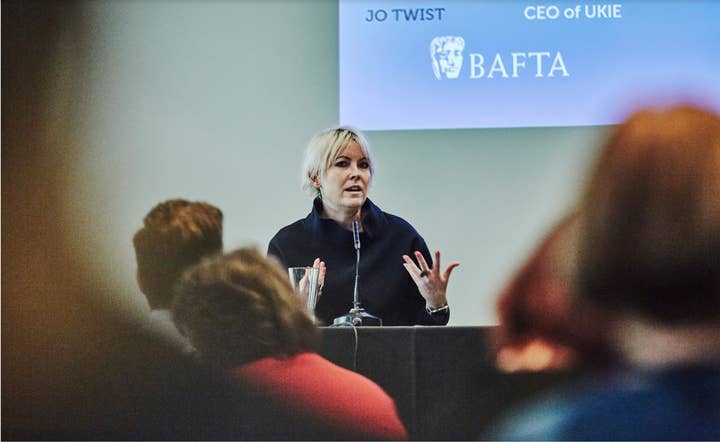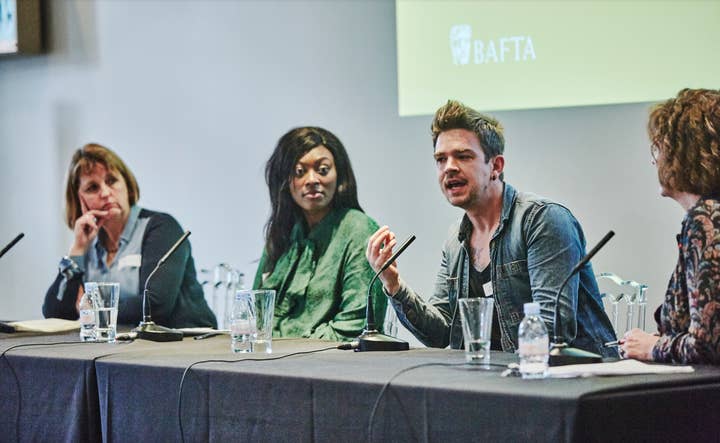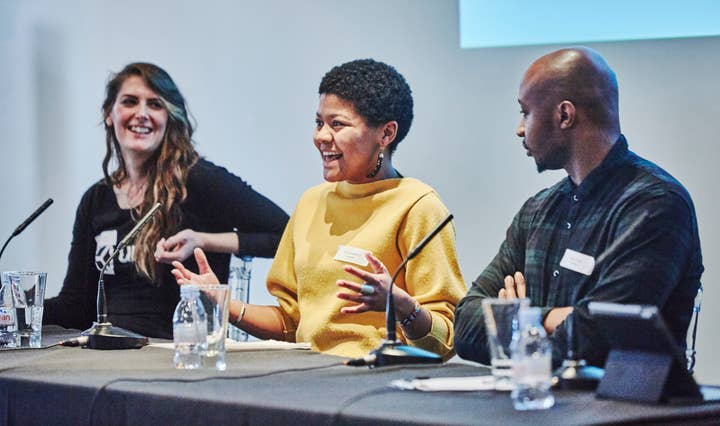Finding your place in the Creative Industries
Unity's Liz Mercuri shares advice offered to aspiring developers and more at the recent BAFTA Creative Careers Showcase
The first ever BAFTA Creative Careers Showcase was held at BAFTA's London headquarters on November 9th, and brought together an assortment of teachers, career advisors, aspiring talent and industry professionals and veterans.
The result was a mixing pot of industry knowledge, bubbling with insight and enthusiasm, fuelled by informative panels and breakout sessions. As a panelist at the showcase, I was blown away by the sheer amount of useful information available.
If you are a teacher or tutor looking to align your learning content to the creative industries, a career advisor looking for the relevant resources to provide your students with or looking to break into the creative industries yourself, then this article is bursting with the information you need.
Where are the Job Opportunities?
The first panel of the day, hosted by BAFTA's director of learning and new talent Tim Hunter included the fantastic insights of: Kate O'Connor, executive chair of the Animation UK Council; Alison Small, CEO of the Production Guild; and Jo Twist, CEO of UKIE. First things first then, what are the Creative Industries and what makes them so important?
The creative industries, which bring the UK an annual revenue of over £80 billion, is defined by the UK Government's Department for Culture, Media and Sport (DCMS) as: "Industries which have their origin in individual creativity, skill and talent and which have a potential for wealth and job creation through the generation and exploitation of intellectual property."

This comprises of the arts, film, television and games, and is growing faster than any other industry. Historically, careers in the creative industries were not deemed stable or lucrative but with over two million people in the UK working in such industries, this archaic ideal is shifting. Kate O'Connor added to this that with new funding and tax incentives, there are due to be a further 10,000 new jobs created to take on this growth.
Jo Twist spoke of the need for new voices within the creative industries by saying that, games in particular are a demonised medium. In reality though, games are rather grown-up in that they are different depictions of the world around us, told from different points of view, gleaned from diverse life experiences. These new voices, from different backgrounds, ethnicities and age groups for example, further enrich the games we play through the personal experiences and points of view woven into the stories they tell. Jo Twist further added, with over two billion people playing games worldwide, it is no surprise that diverse gaming experiences are desired.
Talent Spotting
The second panel of the day was hosted by Sara Putt, film and TV agent and chair of the BAFTA Learning & New Talent Committee. The panelists, with a diverse range of experience across the industries included: Louise Hussey, a VFX producer from Double Negative; Priscilla Baffour, a talent and diversity consultant from ITN; and Michael Warburton, head of computer games development at Cambridge Regional College and winner of the BAFTA Young Game Designer Mentor Award in 2016. This panel tackled the tough questions of what careers are available and how do I best prepare my students for industry?
The previous panel paved the way to answer such questions. Jo Twist highlighted that games and the creative industries are so much more than just Science, Technology, Engineering and Mathematics (STEM) professions. Whilst there is a shortage of programmers or similar professions that require the necessary STEM skills, the creative industries are so much more than this. Let us not forget the producers, marketing team, accountants and writers all of which are also cogs in the creative machine.

There are a number of entry level jobs available for those wishing to break into the creative industries and it is worth noting that the skills required are applicable across industries. The skills needed for a junior artist in games are likely to be very similar to those of a junior artist for animated film.
Michael highlighted that it can sometimes be rather difficult to secure placements or internships in industry, therefore it is incredibly important to bring the industry to the classroom. Michael is head of Rizing Games, a student-led games company at Cambridge Regional College. Here students work in a game development studio environment, working across disciplines and to deadlines on project based team modules. The students aren't only honing their creative and technical skills, but also their soft skills too. Talks from industry professionals and exhibiting their work at industry events such as E3 and EGX adds further context to their studies.
"Whilst there is a shortage of programmers or professions that require STEM skills, the creative industries are so much more than this."
Priscilla identified three barriers to industry, the first of which was networking, as in not knowing anyone in the industry you wish to be part of. The second was communication - not just your peers but also with family and friends, to educate them on the creative industries and the wealth of jobs available. The final point was information. It is partly the responsibility of those in the creative industries to communicate these career opportunities and helpful initiatives or networking and knowledge share events.
Priscilla also recommends using social media to keep in touch with the industry. Follow your favourite film producers or game developers, comment on the work of others which has inspired you and share your own work too. You can also find out about a number of industry initiatives and events by following your favourite companies and individuals on social media too.
It was also highlighted that the careers available are highly applicable to those with disabilities too. Priscilla spoke of the Channel 4 Rio initiative in which a number of disabled creatives were selected to work for Channel 4 on the production and coverage of the Rio Paralympics 2016. Whatever your background, gender, age or disability, the creative industries will have a role to suit you.
Pathways to Employment
The final panel of the day, was Pathways to Employment. The panelists were all in academia or recently graduated and included: filmmaker Shola Amoo, a graduate of the NFTS; Kine Mokwena, an ITN apprentice; and myself, Liz Mercuri, previous BAFTA Scholar and educational evangelist at Unity Technologies, winner of this year's BAFTA YGD Hero Award. This panel gave insight into what opportunities are available for those wanting to break into the industry and what skillsets do they need?
The creative industry is an industry of innovators, who are constantly learning and evolving to keep up with the tides of technology and customer demand. With this comes the need for new talent to be just as versatile and adaptable. Having passion in your chosen trade often helps to facilitate this continued growth.

In the previous panel, Alison Small from the Production Guild highlighted this with an example of how HBO trained their make-up artists for Game of Thrones. Whilst filming on location, rather than bringing an entire makeup artist team with them, they trained up students from a local institution studying professional makeup. Some of these students had not previously thought about applying their artistic skills to film, television or theatre. With the help of HBO in highlighting such career opportunities, these students were able to boost their skill sets and rise through the ranks. Alison concluded by saying that it is the responsibility of long running companies and franchises to nurture young hopefuls and to build the skillsets necessary to succeed in the industry.
Personally, I took an academic route, completing a Masters in Computer Game Development at Sheffield Hallam University, along with the incredible support of BAFTA and Warner Brothers. It was my course leader who informed me of the BAFTA Scholarship and urged me to apply.
"Whatever your background, gender, age or disability, the creative industries will have a role to suit you."
The panel highlighted the importance of researching which roles in the industry you would like to go into and choosing a university course relevant to you. Creative Skillset Accredited Courses, like the one I completed at Sheffield Hallam, have a seal of approval as being closely aligned to industry standards and skill requirements.
Shola also took an academia route, graduating from the NFTS and now working closely with the BFI Film Academy. In creating a network of industry peers, Shola is now creating short films, some of which have been supported by the British Council.
But academia isn't the only route into the creative industries. Kine is an apprentice at ITN. Kine, who found out through the apprenticeship through the ITN Twitter account, says that an apprenticeship is an incredible taste of the creative industry. Kine has worked across many different departments and shadowed many roles within ITN and now has a much clearer picture of where she wishes her creative career to go.
The panel highlighted the importance of networking and not being afraid to put yourself and your work out to the community for insight and feedback. This also raised the importance of having a mentor.
Having regular feedback and communication with the active creative community is fantastic, but do not be afraid to ask for a mentor. There are a number of formal mentoring schemes like the John Schofield Mentoring Scheme for journalists but don't be afraid to talk to and approach those who inspire you to ask them if they would like to be your mentor. Even if the contact is minimal or for a short amount of time, it could make a world of difference.
So much information, so little time!
The Creative Careers Showcase ended with a breakout session. During this session, attendees could ask industry professionals from the likes of titans such as Creative Assembly and ITN, anything and everything.
The number one question was: "There is so much information to take in! Where can I find it all!?"
- For information on the creative industries in terms of UK games companies, the revenue generated and industry growth, the UKIE Games Map is the perfect resource.
- If you would love to join the creative industries but you aren't sure which role is right for you,the Creative Skillset Job Roles site has a wealth of information on the diverse range of careers available across the creative industries including job descriptions, required skills and desired experience. It was also recommended, that if you aren't sure of the jobs available in the industry, watch the credits. The credits to your favourite television show or game are very telling.
- If you are wanting to look for jobs in your chosen industry, advice from the panel was to look at the websites of companies you aspire to work for. See what jobs they have listed and in what teams. Be sure to take a look at the skills required. You can also keep up to date with job listings by regularly subscribing to trade press.
- If you would like to help encourage those wishing to join the industry, you can register to be a UKIE Videogame Ambassador or join the Speakers for Schools Charity, to provide help and insight to new industry talent.
- Networking events are a great way to engage with active members of the industry, share your work and stay inspired. Follow your favourite studios and industry professionals on social media to keep up to date with industry relevant events. Also be sure to keep an eye on their websites too. A number of industry initiatives can also be found in this way, included but not limited to BAFTA Guru Live, Channel 4 for Talent, Rocliffe, ITN Open Newsroom and Microsoft Game Changers for games.
- If you are a teacher or tutor who wishes to stay closely connected to the games industry, being involved with BAFTA Young Game Designers and UKIE Digital Schoolhouse is for you. These initiatives work closely with industry, identifying the skills necessary for a career in the games industry, providing relevant workshops and resources to registered educational institutions.
- For details on apprenticeships, you can find these by checking company websites or searching the Government Website.
- It is worth noting that many industry specific tools are offered to education for free or at a discounted price. For example, Unity offers free academic licenses for qualifying educational institutions.